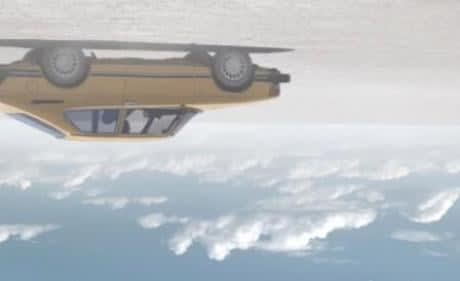Having already established a propensity for the oblique and disarmingly literal with his killer tire allegory, Rubber, Quentin Dupieux' distain for normalcy and convention demonstrated in his follow-up, Wrong, is almost expected. It's as though a mid-movie comment about a second edition book working as a mature clarifier for the original implies intent in itself, suggesting that this tale of a man looking for his lost dog is, in its own way, a remake or qualifying indicator of a mass misinterpretation of Rubber.
A strong sense of tone and structure is defined from the outset, opening with a firefighter openly defecating in the middle of the street while a van burns behind him. As our protagonist Dolph (Jack Plotnick) sleeps, the clock strikes 7:60, leading into a day where he finds his dog missing and a pine tree standing in his backyard where a palm tree was the day before.
With deliberate framing and unsettling, yet specific, composition and crystal clarity, Dupieux captures these moments with disarming frankness, taking something banal, like a conversation between two neighbours, and turning it into a clue or act of subtext. And indeed, when Dolph emerges from his house in a robe asking his neighbour about his dog, only to be maneuvered into an ideal conversation position and lectured on the unseemly nature of walking around in pyjamas, we get a sense that the titular wrongness is the point in itself.
Characters candidly confess their passive-aggressive intentions to each other while the narrative zigzags around peculiarities like a pizza customer service agent (Alexis Dziena) sending a free pizza and an offer of sex to Dolph after he engages her in a conversation about the logistics of using a rabbit on a motorcycle as a mascot. Dolph himself is a bit of a sad sack, going to work each day despite being fired three months prior, defying the dominant reiterated theme of desperation for change and all things new.
Cars are randomly painted different colours and characters come back to life after dying, reiterating the deliberate template of off-centered peculiarity as an enlivening, motivating force, allowing us to appreciate the palm tree or dog we'd become accustomed to. Alternatively, what motivates this fear of change, dread of difference, or need to return to a "normal" state? In structure, Wrong pulls us out of a standard narrative to acknowledge the peculiarity of the supposed normal behaviour in day-to-day conversation and unspoken motivators, simultaneously representing the fear of where the unknown might take us by featuring a trajectory of driving into the void, or confronting anxiety, as seen on the poster.
This deliberately heterodox format will surely alienate those unprepared for, or uninterested in, active engagement and analysis but serves as thoroughly energized mental entertainment for those in the know.
(Films We Like)A strong sense of tone and structure is defined from the outset, opening with a firefighter openly defecating in the middle of the street while a van burns behind him. As our protagonist Dolph (Jack Plotnick) sleeps, the clock strikes 7:60, leading into a day where he finds his dog missing and a pine tree standing in his backyard where a palm tree was the day before.
With deliberate framing and unsettling, yet specific, composition and crystal clarity, Dupieux captures these moments with disarming frankness, taking something banal, like a conversation between two neighbours, and turning it into a clue or act of subtext. And indeed, when Dolph emerges from his house in a robe asking his neighbour about his dog, only to be maneuvered into an ideal conversation position and lectured on the unseemly nature of walking around in pyjamas, we get a sense that the titular wrongness is the point in itself.
Characters candidly confess their passive-aggressive intentions to each other while the narrative zigzags around peculiarities like a pizza customer service agent (Alexis Dziena) sending a free pizza and an offer of sex to Dolph after he engages her in a conversation about the logistics of using a rabbit on a motorcycle as a mascot. Dolph himself is a bit of a sad sack, going to work each day despite being fired three months prior, defying the dominant reiterated theme of desperation for change and all things new.
Cars are randomly painted different colours and characters come back to life after dying, reiterating the deliberate template of off-centered peculiarity as an enlivening, motivating force, allowing us to appreciate the palm tree or dog we'd become accustomed to. Alternatively, what motivates this fear of change, dread of difference, or need to return to a "normal" state? In structure, Wrong pulls us out of a standard narrative to acknowledge the peculiarity of the supposed normal behaviour in day-to-day conversation and unspoken motivators, simultaneously representing the fear of where the unknown might take us by featuring a trajectory of driving into the void, or confronting anxiety, as seen on the poster.
This deliberately heterodox format will surely alienate those unprepared for, or uninterested in, active engagement and analysis but serves as thoroughly energized mental entertainment for those in the know.
